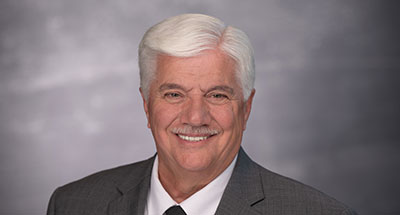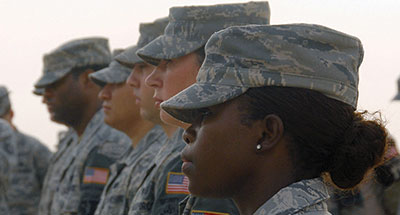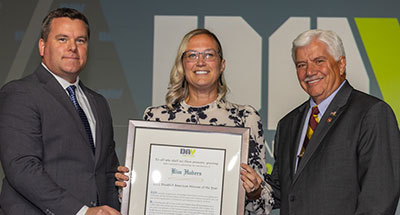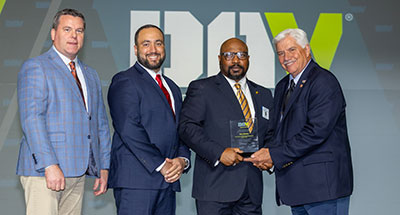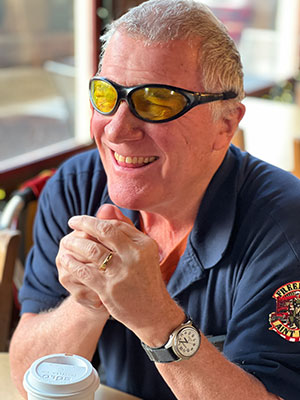

Marine veteran devotes life to serving others in his community
A North Vietnamese Army bullet had Randy Schmidt’s name on it. Holes on the left and right sides of his helmet made it appear as though it shot clean through.
But it didn’t. Somehow, it passed behind his head, knocking the Marine out and leaving him with only a minor grazing wound.
“It looked like it shaved his fur right around his head,” said Haywood Riley, a platoon sergeant with Company K, 3rd Battalion, 1st Marine Regiment. Schmidt was also in Company K.
“The guys in my platoon made the comment, ‘Look at that! Schmidty’s head is so tough, the AK-47 round decided to go around it rather than try to go through it!’” Schmidt said.
The Marine’s lieutenant offered him the option to be medevac’d to the USS Valley Forge for treatment. But the infantry anti-tank missileman refused to leave his platoon, opting instead for corpsman care to stave off potential infection. He felt fine, he told the lieutenant, downplaying his injury.
Schmidt’s next brush with death came six weeks later at Camp Carroll south of the Vietnamese Demilitarized Zone, where he was inside a bunker that collapsed. He thinks torrential rain—unlike any rain he’d ever seen before—combined with the makeshift bunker’s shoddy construction caused the sandbags to give way. Riley said the storm may have been a contributing factor, but it was more likely a close impact from enemy artillery fire that caused the cave-in.
All Schmidt remembers is when he came to, he was unable to move his arms or breathe.
“Once I exhaled, I couldn’t inhale because all that weight was on me,” he said.
Then everything went dark.
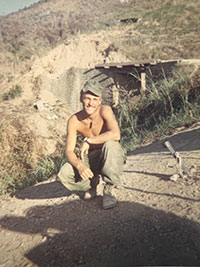

Schmidt doesn’t remember being pulled out of the collapsed bunker. He doesn’t remember being put in a body bag. Riley said when the corpsmen dug Schmidt out of the rubble, they thought he was dead until one of them saw his fingers twitch.
After receiving a dose of morphine and being transported to the Valley Forge, Schmidt spent 10 days recovering. He was badly bruised but otherwise OK, though he did notice his vision had become a little blurry.
He made his way back to Company K, where he confided to his close friend, Daniel Gallagher, that his vision was actually worse than he was telling unit leadership. And though he had also begun developing frequent headaches, he was determined to continue serving alongside his fellow Marines.
“I’ve always been a kind of person that if I start something, I want to finish it,” Schmidt said. “No matter how difficult it might be.”
A month before he was due to rotate out of Vietnam, there was one final operation standing between Schmidt and his flight home. But Gallagher, recognizing his friend was in no condition to go on patrols, interceded with his lieutenant, and Schmidt was ordered to remain behind.
Shortly after the rest of his platoon went out, Schmidt sent Gallagher a letter telling him to keep his head down and to be safe. It was later returned, unopened.
On Jan. 21, 1969, Gallagher was killed by an explosive device while on patrol in Quảng Nam province in South Vietnam.
“Of all the things I experienced in Vietnam—all the different things we had to do—nothing troubled me as much as losing Danny that way,” said Schmidt.
It was Gallagher’s death that shaped the rest of Schmidt’s life.
“I was troubled for a long, long time after that, thinking about that,” said Schmidt. “So what I ended up doing … was to promise Danny that for the rest of my life everything I do will be for you and for me together as a team. I will do everything thinking about you as I’m doing it, since you weren’t able to go on to live the rest of your life.”
With Gallagher’s death still fresh on his mind and with his vision continuing to worsen, Schmidt returned to Camp Pendleton, California, in February 1969 before being transferred up the coast to the Marine Barracks at Concord Naval Weapons Station. By the following year, it became evident to Navy doctors that he was no longer able to serve, and he was medically discharged in March 1970.
Schmidt took a job as a janitor for San Mateo County, California, while finishing his bachelor’s degree in social services. With the degree, the county hired him to be a juvenile counselor, promoted him to be a probation officer and then, in 1985, offered him a role sitting on the bench as a juvenile traffic hearing officer. With his vision continuing to deteriorate, those years honed his ability to read people through their tone of voice and not by how they looked. Newspaper clippings from those years talked about literal blind justice and his firm fairness when issuing rulings. He never had one of his rulings overturned.
In 1990, he started going to the Department of Veterans Affairs Western Blind Rehabilitation Center in Palo Alto. He met an instructor there named Liz, who was also blind. They married in 1992.
In 1998, needing some time to focus on his family, Schmidt took early retirement from his work in San Mateo County. Having traveled the country attending annual reunions for the 1st Marine Division, he and Liz decided to relocate closer to friends in Medina, Ohio, in 1999.
After moving and fully retiring, he began looking for opportunities get involved, which he found in his church and with local chapters of veterans organizations, including DAV.
Before long, Schmidt was marching with the American flag in nearly every parade in the county, participating in honors details at the veterans cemetery, selling Forget-Me-Nots during DAV’s annual fundraiser and sitting with lonely hospice patients in their final hours. He’s golfed for charity events, gone on missions and whitewater rafting trips with his church, and skied during the National Disabled Veterans Winter Sports Clinic, co-presented by DAV and the VA.
“Whatever came up and whatever does come up, well, he jumps right into it. There’re no second thoughts about it,” said Rich Bonitz, who volunteers with Schmidt. “He’s a true leader, and it shows in his everyday life.”
The different organizations he volunteered with started recognizing his leadership ability. Among other roles, he also served as commander for DAV Chapter 72 in Medina.
“Randy is the example of what you want to be and not let a disability keep you from participating in life to the fullest,” said David Bilinovich, a fellow DAV member and former Department of Ohio commander.
After being in Medina only a couple of years, Schmidt was asked by chapter leadership to serve as the DAV representative for the Medina County Veterans Service Commission, advocating for veterans and helping connect them to county resources.
In 2008, and with Schmidt still a commissioner, Edward Zackery, who had recently retired from the Army, applied for the director’s position at the office overseen by the commission.
The two lived in the same neighborhood, so Zackery started driving Schmidt to county meetings. Those rides blossomed into more frequent interactions, and soon, a lifelong friendship developed.
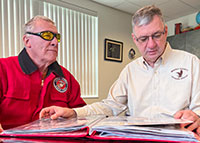

Their families frequently get together. They travel together, going to places including the Baseball Hall of Fame in Cooperstown, New York, and presidents’ homes—a favorite activity of Schmidt’s. In each case, Zackery is Schmidt’s eyes, helping him navigate, describing what he sees and patiently reading every plaque.
Zackery said he is grateful for Schmidt for showing him, his wife and his children what living a good life full of joy and gratitude looks like. Instead of bitterness, Zackery said he’s seen an outgoing, generous person who doesn’t let his disability limit his ability to serve others and enjoy life.
“Randy sees better than most people that have their sight,” said Zackery. “The blindness is really just kind of like a short speed bump that he’s gone over in his life.”
Zackery said Schmidt’s inability to see things in the physical world has also given him the ability to see the heart of issues and understand people’s situations better than most. This has been an asset in his role on the veterans service commission, where he would regularly hear stories of veterans in need. It’s a perspective and patience Bilinovich recognizes, too.
“You and I look at stuff and make a quick decision. He doesn’t have that ability. He has to sit there and talk to you and hear you out,” Bilinovich said.
Schmidt’s term on the commission ended on Dec. 31, 2021, 20 years after he started. DAV member Victoria Olson, who served in the Navy as a corpsman during the most recent conflicts, was sworn in as his replacement. She is the first woman veteran to serve on the commission.
Olson serves as an example of what Schmidt and other older veteran volunteers in Medina say they hope to see more of: younger volunteers stepping in and assuming roles of leadership to benefit other veterans. Without their involvement, Schmidt said, the community would lose out on special events and touches that help bring joy and services to veterans and their families.
“All these parts of our culture that we have would go away if younger veterans didn’t step up and take over,” said Schmidt.
He said serving veterans for the past two decades has been a wonderful, fulfilling experience.
“I hope I’ve done Danny Gallagher good, that I kept my promise for him,” said Schmidt. “If you look back, he really was the motivation behind pushing myself to do the best I could to help others that were in need or needed someone to help them in whatever crisis they were dealing with.”
Now in his 70s and with Parkinson’s disease making it more difficult to walk and stand, Schmidt is ready to take a step back from active leadership roles. But that doesn’t mean he’s done serving his community. No one believes that’s the case.
“As long as I’m alive and breathing, I’m going to do what I can to help,” said Schmidt.


